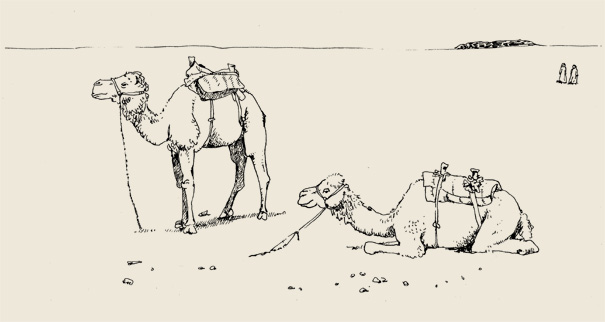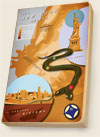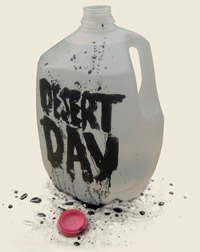From Tell Me about a Reassuring Hand, by Levi Stahl

Illustration by Aurora Andrews
In my traveling days, I lived for a few years in a village at the edge of a great desert. In this village were only twins. I was tolerated, even, at times, celebrated in song and dance, as an aberration, a visitor from a strange world where a person is forced to fend for himself without the aid of his mirror companion. The townspeople were unable even fully to comprehend my state; the loneliness and uncertainty they assumed for me tainted all our conversations, surfacing in the pomegranate tarts two sad-eyed women would bring to my hut, the freshly killed hart delivered by two silent hunters. Their astonishment was understandable. As far as anyone could remember, only identical twins had ever been born to the women of the village. Twins were born of marriage, twins were born of adultery, were born of the young and of the old.
Though I was happy in that village, and might have lived out my life among those shifting dunes, a singular event forced me to leave: a woman, completely ordinary and unremarkable in every other way, gave birth to a single son. The town was thrown into paroxysms of fright. This would disturb all their systems, all their ways of life. Though the people of the town were not cruel, their lives were shaped by the harshness of the desert. The hot wind sweeping all before it rendered their customs stony. Their only precedent for this solitary birth was a time in the distant past when the second baby of a pair was born dead, strangled by the umbilical cord of the first. The living child, having brutally failed his most sacred charge, that of caring for and protecting his mirror, was exposed. Remembering that, someone suggested killing this solitary baby. That idea — its cleanness, simplicity, and finality — appealed to the crowd, even to the shamefaced father, and almost before the mother could realize what was happening, killing the baby had become the preferred plan.
At that point that I returned from a trip to some burial caves up on the ridge. As I reached the edge of town, I saw a woman lying slumped against a rock, heaving with sobs, eyes staring up at the unforgiving noonday sun, unseeing. Alarmed, I knelt and took her hand. I knew her, knew that her twin had been expected to give birth that day, and I feared for her twin’s health. I wiped her face, feverish from fear, with my robe, but her sorrow was an oasis that, though a whole herd may drink from it, never runs dry. Through her sobs, the woman told me what was about to occur.
She said, “I fear for the child, yes, but also for his twin. No, his twin was not born here, but as all men have twins — I would even venture to say that you, all the way from your strange land, have an unknown twin — I fear for his twin, about to be left utterly alone, like a desert fox after a sandstorm. Who will speak for him? Who will stand at his back in time of war, at his side in time of peace, outside his tent in time of love? Who will kneel at his feet in time of need? To kill one twin is to atrophy and doom the second, the unknown twin, waste him away under the misunderstanding eyes of his parents. It is to deny the symmetry of the world, it is a cruel, cruel thing, and my sister has no recourse.”
I knew then that I must leave the village. Its people had been kind, their songs heart-rendingly beautiful, but now I would leave. I would go to the people, ask that the boy be considered my twin, that he be given into my care. We would journey together, either until we found his twin or until the two of us, by minuscule changes over time, were found to be twinned to each other.
I found the villagers in the meeting tent, circling the child and his mother, who had long since become insensible with grief. Their stony faces, flickering with fear, revealed that a simple request would not do. So I told of a dying beggar on the far continent of my birth, of his rasping last words as he lay propped against a shade tree, of his assurances that I was twinned — he could hear it in my breathing, see it in the set of my jaw, the cool air ranging itself about my frame — but that my twin had been delayed to complete a celestial mission, would only be made manifest after an astral reckoning. Seeing their rapt attention, I continued, as the mendicant explained that I would find my twin where he did not belong, was not expected, had no place, a child of water among sand, a child of green among brown. The mother, returning to alertness as my story concluded, strode through the crowd to me, and, bowing deeply, gave the child into my arms. Before anyone could reconsider, I handed an elder my village cape and left there forever.
The boy and I journeyed together for many years. Traveling with an infant brought its own hardships, but the people of the road as usual showed their kindness and care — thrice, nameless gypsies cured my twin of burning fevers — and as he grew, we had many adventures. A mystic we encountered tried to mold clay into a twin for the boy, but it came to naught. In a hilly, green country, we parted ways, as, following a fever vision, he devoted himself to religious study in a quiet stone monastery. As I left, sorrowful in the midst of the happiness I felt for the boy, I saw a familiar face watching from an upstairs window. Perhaps it was him, watching me as I wound my way down the grassy trail? Perhaps it was his real twin, his wait over? Or could it have been my twin, forever unknown?
Now that I think about it, though, it could be that I am conflating two distinct tales. I may have been the one who suggested exposing the infant, rather than killing him outright. I distinctly remember leaving rags bloodied by a slaughtered lamb and taking an unwanted child with me to safety. Whether it was that child or another, I am not certain. Ω







